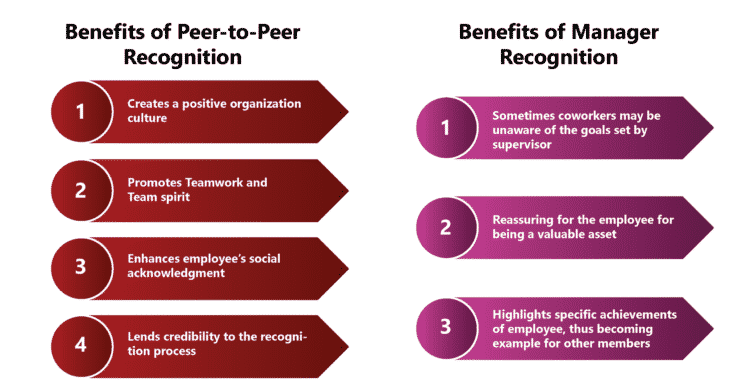Peer-to-peer or manager-led recognition — explore what works best, when to use each, and how to combine them for maximum impact.
1. Peer-to-peer recognition is increasingly popular for boosting employee engagement and creating a positive work culture, as employees consider it more unbiased and credible.
2. Manager recognition remains essential, especially for acknowledging specific achievements and setting examples for others, though it sometimes seems less transparent.
3. Peer-to-peer recognition enhances teamwork, social acknowledgment, and a sense of satisfaction, while manager recognition reassures employees of their value to the organization.
4. A balanced approach, combining peer-to-peer and manager recognition, is essential for a successful employee recognition program that motivates and engages the workforce.
The two most commonly used employee recognition methods are Peer-to-Peer Recognition and Manager Recognition. However, there is always a debate about which method is more effective for an organization.

As the name suggests, peer-to-peer recognition is the method of recognition, where the employees are appreciated by their co-workers for their effort, contribution and support towards business growth.
Although it is a relatively new tool for recognizing employees, it is gaining popularity across organizations as an effective way to boost employee engagement and motivation.

It is due to a relatively unbiased assessment of employees’ performance and behavior by those who work with them regularly.
It lends greater credibility to this employee recognition strategy in the eyes of the entire workforce, making it more satisfying for the recipient.

A study has revealed that peer-to-peer recognition programs are used in nearly 41% of organizations.
In fact, Globoforce Employee Recognition Survey has established the fact that aside from making employees feel satisfied, this method of recognition also helps to improve customer satisfaction.
Employees get a greater sense of satisfaction, self-worth, acknowledgment, and achievement when recognized and appreciated by their peers
There are situations where peer-to-peer recognition can provide more significant benefits:

Peer-to-peer recognition fosters a work culture in which employees praise their colleagues and candidly, transparently appreciate their accomplishments.
The employees learn to interact and openly share their views and opinions about various aspects of work and the organization.
Hence, this helps create a friendlier, more cordial workplace environment, promoting strong interpersonal bonds among employees.
The overall result is a positive work culture.

Peer recognition helps in fostering a deep sense of collaboration and camaraderie among employees.
It, in turn, significantly reduces discord and differences among employees, enabling coworkers to resolve work-related disputes without management intervention.
It fosters team spirit, making employees genuinely supportive of each other.

Additionally, their coworkers’ recognition fills employees with a deep sense of satisfaction and gratitude.
They experience positive energy and happiness due to the affirmation and acceptance of their colleagues.
Hence, receiving appreciation from co-workers makes the recognition process as a whole more meaningful.

Also, the employee recognition process can drive results provided that are truly transparent and unbiased.
Peer-to-peer recognition is the best way for organizations to achieve this objective.
Hence, apart from enhancing trust and camaraderie among employees, it makes employee recognition transparent and fair.

In this method, acknowledging and rewarding the employees rests primarily with their managers and supervisors.
The managers use various criteria to identify candidates worthy of recognition. They then select the ones that outshine the others based on predefined parameters.
Despite being a traditional employee recognition policy, it is losing its sheen in modern organizations as a significant percentage of employees do not perceive it to be unbiased.

However, many employees consider this method unreliable because they believe managers are unaware of their competence and capabilities and hold preconceived notions about them.
Managers who regularly recognize the performance of their employees can contribute towards improving engagement by roughly 60% as suggested by Turbocharging Employee Engagement: The Power of Recognition from Managers, as it helps to enhance employees’ well-being.

Despite the growing popularity of peer-to-peer recognition, the importance of employees being recognized by managers cannot be undermined.
There are a few scenarios at the workplace where this method of employee recognition might hold the edge:

Managers may recognize specific achievements of employees that align with goals set or tasks allocated by their supervisors, which their coworkers might not be aware of.
Manager recognition can be reassuring to employees, as it demonstrates that they are valuable assets to the organization, thereby boosting their morale and productivity.
Most importantly, manager recognition is essential for highlighting specific achievements and behaviors that serve as examples for other workforce members to emulate.
A survey also revealed that 85% of employees think managers and leaders should spot good work and give praise at the moment, and 81% think this should happen on a continuous, year-round basis.

Recognition given by colleagues to one another—appreciation for effort, contribution, or support from those who work alongside.
Recognition where supervisors or managers formally acknowledge employees based on performance or achievements.
– More perceived fairness and credibility
– Fosters teamwork and camaraderie
– Provides social acknowledgement and boosts morale
– Increases transparency in the recognition process
– When achievements are known only to the manager (not visible to peers)
– To signal organizational importance and set examples
– To boost employee confidence that the leadership is noticing their work
Employees sometimes feel that manager-based recognition can be subjective, biased, or limited by managers’ limited visibility into contributions.
Neither is strictly better—both peer and manager recognition have strengths—and we advocate using both together to foster a robust recognition culture.
HiFives reveals that approximately 41% of its client organizations utilize peer-to-peer recognition programs.
An industry survey indicates that 85% of employees believe managers should recognize and praise good work immediately, and 81% expect continuous recognition throughout the year.
Use peer-to-peer for frequent, everyday recognition, and manager recognition for milestones, strategic achievements, and role modeling. Recognition programs are most effective when they combine peer-to-peer and manager recognition—offering fairness, emotional connection, and organizational validation.
Peer-to-peer and Manager recognition are the two main pillars of a successful employee recognition program and should be used in tandem by an organization to motivate and engage its workforce.

Lead author: Sagar Chaudhuri, the Co-Founder and CEO of HiFives. He is an HR Tech Evangelist with over 25 years of experience in both corporate and entrepreneurial settings. Previously, Sagar has held leadership roles at companies such as Genpact, Infosys, and ICICI Bank. He has an engineering degree from IIT Kharagpur and an MBA from IIM Lucknow. Connect on LinkedIn
To stay updated on the latest HiFives blogs, follow us on Twitter (@MyHiFives)